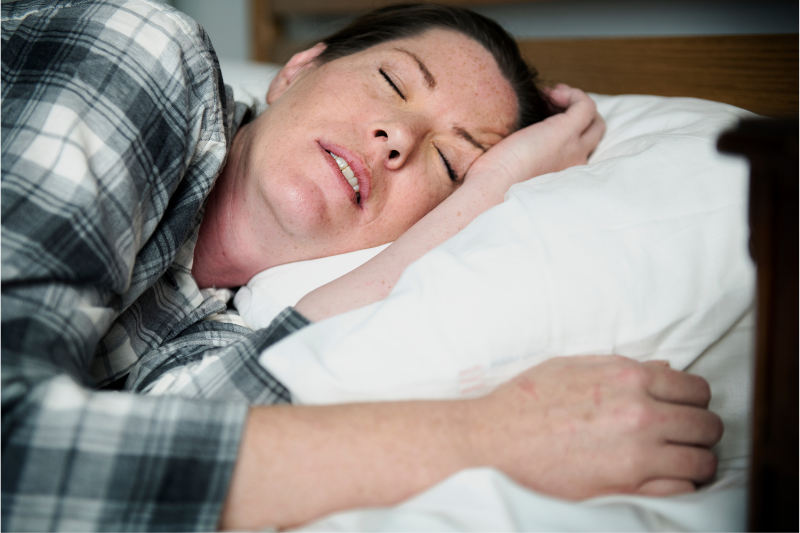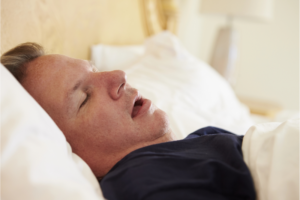Sleep apnea might seem like a simple inconvenience—snoring loudly and feeling tired in the morning. But this common sleep disorder hides potentially serious health concerns. Obstructive sleep apnea (OSA) occurs when your breathing repeatedly stops and starts during sleep, disrupting your body’s ability to get the restful oxygen it needs. It’s important to see a sleep apnea doctor so you can understand the hidden dangers of sleep apnea and take steps to protect your long-term health.
Health Risks of Untreated Sleep Apnea
Cardiovascular Health
- High Blood Pressure (Hypertension): Sleep apnea puts a tremendous strain on your cardiovascular system. The repetitive dips in oxygen and surges of stress hormones push your blood pressure upwards. This raises your risk of developing hypertension, a major contributor to heart disease, stroke, and kidney problems.
- Heart Disease and Stroke: Untreated sleep apnea significantly increases your risk of heart attacks, heart failure, and strokes. The lack of oxygen and stress on your system damages your heart and blood vessels over time. Seeking treatment can dramatically improve your cardiovascular health.
Neurological Impacts
- Cognitive Issues: When your brain is repeatedly deprived of oxygen throughout the night, it takes a toll on your mental sharpness. Sleep apnea can lead to problems with memory, concentration, decision-making, and overall cognitive function.
- Mood Changes: Sleep apnea throws your mood regulation off-balance. It increases your risk of developing depression and anxiety, impacting your quality of life and relationships. These mood disorders can make it even harder to manage sleep apnea, creating a harmful cycle.
Metabolic Disorders
- Diabetes: Sleep apnea disrupts several mechanisms that regulate blood sugar levels. This makes your body less responsive to insulin, increasing your risk of developing type 2 diabetes. Managing sleep apnea can help keep your blood sugar in a healthier range.
- Weight Complications: Sleep apnea disrupts your sleep cycle, impacting hormones that control hunger and appetite. This can lead to cravings for unhealthy foods and difficulty managing your weight. Because weight gain worsens sleep apnea, this becomes a problematic cycle.
Respiratory Issues
- Asthma: If you have asthma, untreated sleep apnea can make it significantly more difficult to control. Nighttime awakenings, poor oxygenation, and airway inflammation can worsen asthma symptoms.
- COPD: Sleep apnea is frequently linked to chronic obstructive pulmonary disease (COPD). These conditions often overlap, and treating sleep apnea can positively impact COPD management.
Hidden Dangers Beyond Your Health
Daily Functioning
- Work and Focus: Chronic sleep deprivation from sleep apnea takes a serious toll on mental clarity. Concentration becomes difficult, memory falters, and even simple tasks can feel overwhelming. This can significantly impact work performance, leading to mistakes and difficulty staying on top of your responsibilities.
- Driving Dangers: When you’re exhausted from sleep apnea, your reaction time slows, and your ability to focus deteriorates. This makes driving incredibly dangerous. People with untreated sleep apnea are far more likely to be involved in motor vehicle accidents, putting their safety and the safety of others at risk.
Challenges to Your Relationships
- Mood Impacts: Living with sleep apnea often means being chronically irritable and short-tempered due to sleep deprivation. This can put a serious strain on your relationships with your partner, family members, and friends. It’s important to remember that your mood changes might be a symptom, not a reflection of your feelings towards your loved ones.
- Intimacy: Loud snoring is a hallmark of sleep apnea and can severely disrupt your partner’s sleep. This sleep deprivation can lead to resentment and frustration, impacting your intimacy. Additionally, the exhaustion from sleep apnea can lower your libido, further challenging your connection.
Economic Burden
- Medical Bills: Managing the health consequences of untreated sleep apnea can be incredibly costly. You may need frequent medical appointments, tests, medications, and specialized treatment for conditions like heart disease or diabetes, which are linked to sleep apnea.
- Work Absences: Sleep apnea can cause fatigue and impaired functioning, making it difficult to hold down a job. You may miss workdays due to exhaustion or needing to leave early because you can’t concentrate. This lost income adds another layer of stress and economic hardship.
Sleep Apnea Doctor: Diagnosis and Treatment Options
Recognizing the Signs
Don’t ignore the red flags of sleep apnea. Loud snoring, excessive daytime fatigue, witnessed pauses in breathing during sleep, gasping for air at night, and morning headaches are all crucial signs. If you’re experiencing these symptoms, schedule a consultation at Kamelhar-Teller Pulmonology. A sleep medicine specialist will discuss your symptoms in detail, review your medical history, and likely recommend further evaluation.
Treatment Options
- CPAP Therapy: Continuous Positive Airway Pressure (CPAP) is often considered the front-line treatment for obstructive sleep apnea. CPAP machines deliver a gentle flow of air through a mask, keeping your airway open while you sleep. While it can take some adjustment, many sleep apnea patients find tremendous relief with CPAP therapy.
- Oral Appliances/Positional Therapy: A sleep apnea doctor may recommend an oral appliance for mild to moderate sleep apnea. These custom-made mouthpieces help reposition the jaw and tongue to maintain an open airway. Additionally, positional therapy, using pillows or devices to discourage sleeping on your back, can be helpful.
- Surgical Options: In cases where CPAP and other therapies are ineffective, or if there are specific anatomical blockages, surgery may be considered. Procedures like uvulopalatopharyngoplasty (UPPP) or maxillomandibular advancement (MMA) can alter the structure of the airway, improving breathing during sleep.
The Role of a Sleep Apnea Doctor
A sleep apnea doctor, like Dr. David Kamelhar or Dr. Eric Teller, both board-certified pulmonologists, is essential in guiding you through the diagnosis and treatment process. They will likely order a sleep study, either an at-home test or an overnight stay in a sleep lab.
Your sleep apnea doctor will work with you to personalize your treatment plan. Maintaining regular follow-up is important—a sleep doctor will track your progress and adjust your therapy as needed.
Lifestyle Changes to Help
Weight Management
Even a modest amount of weight loss can have a significant impact on sleep apnea symptoms. Excess weight, especially around the neck, can increase pressure on the airway and make it more prone to collapse. A healthy diet and regular exercise are essential for weight management. A sleep apnea doctor or a registered dietician can help you develop a sustainable plan.
Avoid Alcohol and Sedatives
Alcohol and sedative medications relax the muscles in your throat, increasing the likelihood of airway obstruction. Avoiding alcohol, especially a few hours before bed, can make a noticeable difference in your sleep quality. If you use sedatives, discuss alternatives with your sleep apnea doctor for better sleep.
Sleep Hygiene and Positional Therapy
Practicing good sleep hygiene can help optimize your sleep overall, which can lessen the severity of sleep apnea. This includes:
- Sticking to a regular sleep schedule, even on weekends.
- Creating a relaxing bedtime routine.
- Keeping your bedroom dark, quiet, and cool.
- Avoiding caffeine and large meals before bed.
Sleeping on your back can worsen sleep apnea for many people. Positional therapy aims to keep you from rolling onto your back during sleep. There are special pillows, wearable devices, and simple techniques (like sewing a tennis ball into the back of your pajamas) that can help encourage side sleeping.
While these lifestyle changes can be incredibly beneficial in managing sleep apnea, they may not be a substitute for prescribed therapies like CPAP. It’s important to work with your sleep apnea doctor to determine the best combination of lifestyle modifications and medical treatment for your individual needs.
Conclusion
Untreated sleep apnea carries many hidden health dangers, plus detrimental effects on your daily life and relationships. Taking sleep apnea seriously and seeking a diagnosis from a board-certified pulmonologist is the first step towards protecting your health.
Are you struggling with sleep problems, fatigue, or breathing difficulties? Get the expert help you deserve. Contact Kamelhar-Teller Pulmonology today.



